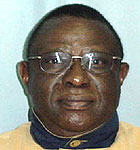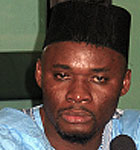Related Research Articles

The International Criminal Tribunal for Rwanda was an international court established in November 1994 by the United Nations Security Council in Resolution 955 in order to judge people responsible for the Rwandan genocide and other serious violations of international law in Rwanda, or by Rwandan citizens in nearby states, between 1 January and 31 December 1994. The court eventually convicted 61 individuals and acquitted 14.

The Rwandan genocide occurred between 7 April and 15 July 1994 during the Rwandan Civil War. During this period of around 100 days, members of the Tutsi minority ethnic group, as well as some moderate Hutu and Twa, were killed by armed Hutu militias. The most widely accepted scholarly estimates are around 500,000 to 662,000 Tutsi deaths.

Théoneste Bagosora was a Rwandan military officer. He was chiefly known for his key role in the 1994 Rwandan genocide for which he was sentenced to life imprisonment by the International Criminal Tribunal for Rwanda (ICTR). In 2011, the sentence was reduced to 35 years' imprisonment on appeal. He was due to be imprisoned until he was 89. According to René Lemarchand, Bagosora was "the chief organizer of the killings". On 25 September 2021, he died in a prison hospital in Mali, where he was being treated for heart issues.
Protais Zigiranyirazo commonly known as Monsieur Zed, is a Rwandan businessman and politician and was governor of the Ruhengeri prefecture in northwestern Rwanda from 1974 to 1989. Zigiranyirazo was a member of the Akazu, an elite circle of relatives and friends of former President Juvénal Habyarimana who pushed the Hutu Power ideology.
The Gacaca courts were a system of community justice in Rwanda following the 1994 genocide. The term 'gacaca' can be translated as 'short grass' referring to the public space where neighborhood male elders (abagabo) used to meet to solve local problems. The name of this system was then adopted in 2001 as the title of the state's new criminal justice system "Gacaca Courts" to try those deemed responsible for the 1994 Rwandan genocide where over an estimated 500,000 people were killed, tortured and raped. In 1994, the United Nations Security Council created the International Criminal Tribunal for Rwanda to try high-ranking government and army officials accused of genocide, war crimes, and crimes against humanity. The Gacaca Courts were established in law in 2001, began to operate on a trial basis in 2002 and eventually came to operate as trials throughout the country by early 2007.
Jean-Paul Akayesu is a former teacher, school inspector, and Republican Democratic Movement (MDR) politician from Rwanda, convicted of genocide for his role in inciting the Rwandan genocide.
Léon Mugesera is a convicted genocidaire from Rwanda who took residence in Quebec, Canada. He was deported from Canada for an inflammatory anti-Tutsi speech which his critics allege was a precursor to the 1994 Rwandan genocide. In 2016, he was convicted of incitement to genocide and sentenced to life in prison.
Simon Bikindi was a Rwandan singer-songwriter who was formerly very popular in Rwanda. His patriotic songs were playlist staples on the national radio station Radio Rwanda during the war from October 1990 to July 1994 before the Rwandan Patriotic Front took power. For actions during the april 1994's genocide against Tutsi, he was tried and convicted for incitement to genocide by the International Criminal Tribunal for Rwanda (ICTR) in 2008. He died of diabetes at a Beninese hospital in late 2018.
Georges Henri Yvon Joseph Ruggiu is a Belgian radio presenter who worked for Rwandan radio station Radio Télévision Libre des Mille Collines, which played a significant role in promoting the genocide against the Tutsi. Like the station's other broadcasters, Ruggiu incited violence against Tutsi and moderate Hutu over the air. He had become involved in Rwandan politics just two years before the genocide.

Hassan Ngeze is a Rwandan journalist and convicted war criminal best known for spreading anti-Tutsi propaganda and Hutu superiority through his newspaper, Kangura, which he founded in 1990. Ngeze was a founding member and leadership figure in the Coalition for the Defence of the Republic (CDR), a Rwandan Hutu Power political party that is known for helping to incite the genocide.
Athanase Seromba is a Catholic priest from Rwanda who was found guilty of committing genocide and of crimes against humanity during the Rwandan genocide.
Ildephonse Hategekimana is a Rwandan soldier who participated in the Rwandan genocide.
Callixte Nzabonimana is a former Rwandan politician who is accused of participating in the Rwandan genocide.
Ferdinand Nahimana is a Rwandan historian, who was convicted of incitement to genocide for his role in the Rwandan genocide.

Joint criminal enterprise (JCE) is a legal doctrine used during war crimes tribunals to allow the prosecution of members of a group for the actions of the group. This doctrine considers each member of an organized group individually responsible for crimes committed by group within the common plan or purpose. It arose through the application of the idea of common purpose and has been applied by the International Criminal Tribunal for the former Yugoslavia to prosecute political and military leaders for mass war crimes, including genocide, committed during the Yugoslav Wars 1991–1999.
Callixte Kalimanzira was the interior minister of the interim government of Rwanda during the 1994 genocide.

Grégoire Ndahimana is the former mayor of Kivumu, Rwanda. Indicted and arrested for alleged war crimes by the International Criminal Tribunal for Rwanda (ICTR), Ndahimana is thought to be one of the key figures in the 1994 Rwandan genocide, and is claimed to have had up to 6,000 Tutsi killed. In 2013, he was convicted of genocide and crimes against humanity and sentenced to 25 years in prison.
Prosper Mugiraneza is a former minister of civil service in Rwanda. Mugiraneza was born in 1957 in Kigarama, Kibungo Province, Rwanda. He is a graduate of the National University of Rwanda in Butare, where he earned a law degree . Before becoming minister of civil service, Mugiraneza was a trial attorney in Byumba prefecture, a chief prosecutor in Gisenyi prefecture, a chief prosecutor in Kigali capital, Secretary General of the Ministry of Justice and minister of labour and social affairs. He is married and has four children. His wife and children currently reside in Europe.
Peter Robinson is an American lawyer who has defended political and military leaders at the United Nations International Criminal Tribunals. His clients include Bosnian Serb President Radovan Karadžić, Rwandan National Assembly President Joseph Nzirorera, Yugoslav Army Chief of Staff Dragoljub Ojdanic, and the lawyer for Liberian President Charles Taylor.
Drew White (QC) is an international lawyer from Canada best known for his role in the conviction of Colonel Theoneste Bagosora, who the media dubbed "the mastermind" of the 1994 Rwanda genocide and who White referred to in his closing trial submissions as one of the "enemies of the human race".
References
- 1 2 3 4 5 "Trial Chamber Delivers Judgement in the Ngirabatware Case". International Criminal Tribunal for Rwanda. December 20, 2012. Archived from the original on April 16, 2013. Retrieved 11 January 2013.
- ↑ "Archived copy" (PDF). Archived from the original (PDF) on 2012-04-05. Retrieved 2011-12-03.
{{cite web}}: CS1 maint: archived copy as title (link) - ↑ "Rwanda genocide suspect deported to Africa". UPI (9 October 2008). Retrieved on 16 November 2008.
- ↑ "Genocide suspect found in Frankfurt", The Times (21 September 2007). Retrieved on 16 November 2008.
- ↑ "Ngirabatware taken to Arusha". Radio Netherlands Worldwide (8 October 2008). Retrieved on 16 November 2008.
- 1 2 Gordon, Gregory S. (2017). Atrocity Speech Law: Foundation, Fragmentation, Fruition. Oxford University Press. p. 215. ISBN 978-0-19-061270-2.
- ↑ Hirondelle News Agency, 20.12.12 - ICTR/NGIRABATWARE - FORMER RWANDAN PLANNING MINISTER JAILED 35 YEARS FOR GENOCIDE [ permanent dead link ].
- ↑ http://www.irmct.org/sites/default/files/casedocuments/mict-12-29/appeals-chamber-judgements/en/141218_0.pdf [ bare URL PDF ]
- ^ "Zoom: The accused still on the run", Hirondelle.org, (30 March 2004).